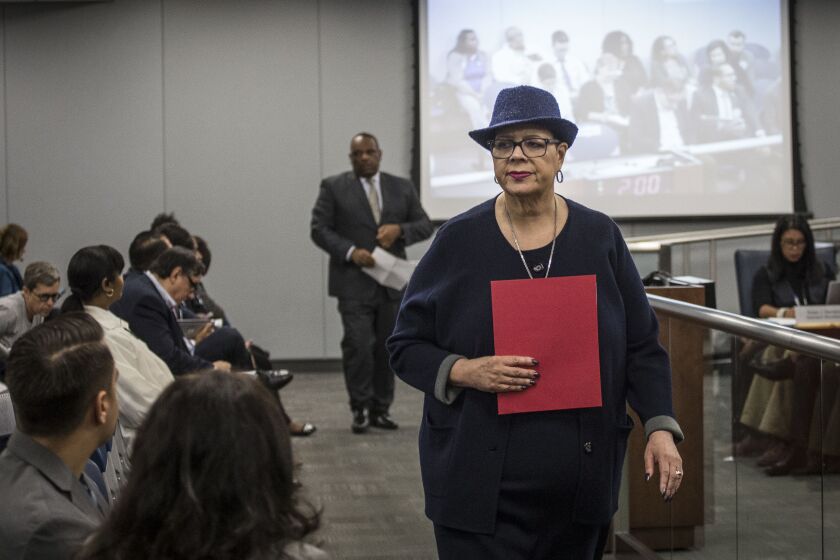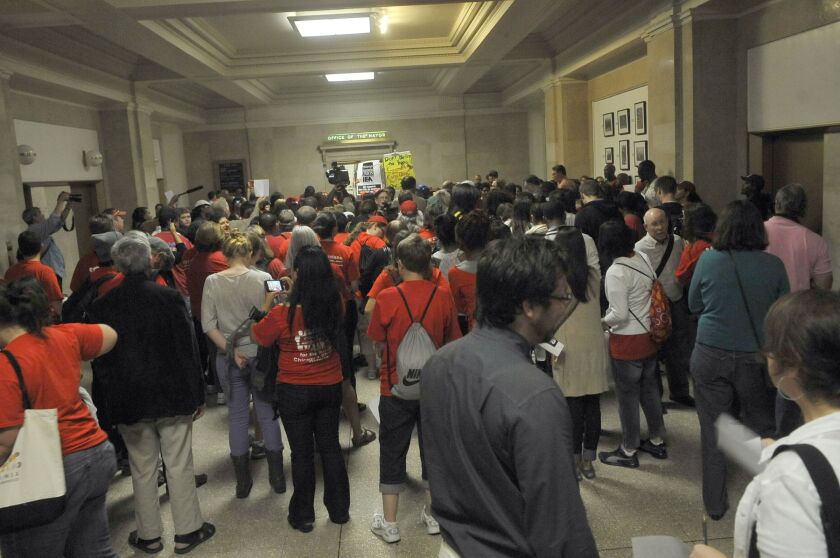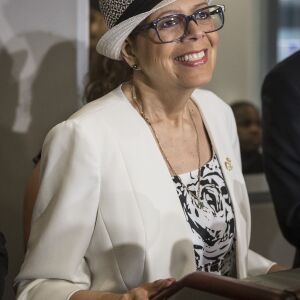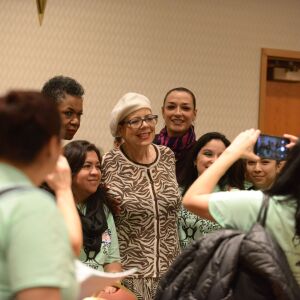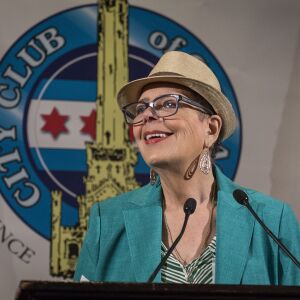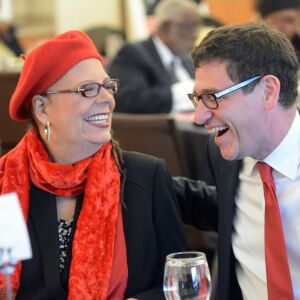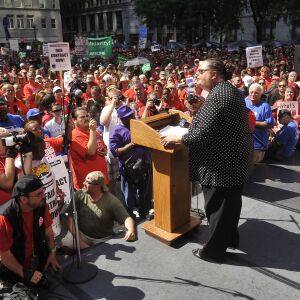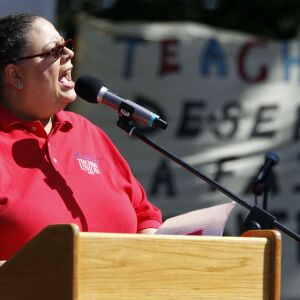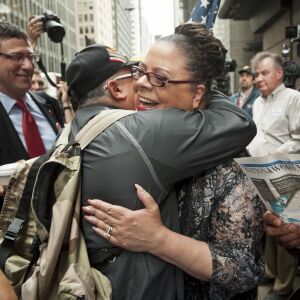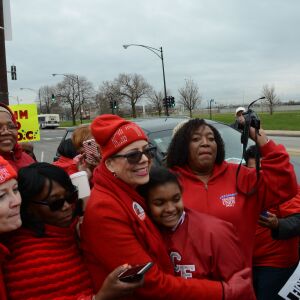Karen Lewis was a fighter.
As the president of the Chicago Teachers Union, she battled for the best contracts her members could get, even as she struggled against aggressive brain cancer.
“Tell our delegates let’s get ready to fight!” Lewis said as she went into another surgery.
The death of the 67-year-old Lewis was confirmed Monday by her spokeswoman.
Lewis clashed fearlessly with Rahm Emanuel, calling him a liar and a bully and worse, to his face. She dealt Chicago’s combative mayor the first public defeat of his mayoral career when she outmaneuvered him in the 2012 Chicago teachers strike, winning raises for her membership in a stumbling economy and inspiring teachers nationwide.
“It had a riveting effect across the country,” said Randi Weingarten, president of the 1.7 million member American Federation of Teachers. “You heard that a lot in 2013, 2014: ‘Just like it happened in Chicago, it can happen here.’”
Lewis was angling to give Emanuel an even bigger blow in what was expected to be her own campaign for mayor in 2015.
Lewis formed an exploratory committee and was “seriously considering” a run, she said, and polls showed her beating Emanuel. But a brain cancer diagnosis late in 2014 forced her to abandon her plans. As it was, her handpicked surrogate, Chuy Garcia, made Emanuel sweat, forcing a run-off election Lewis occasionally participated in, despite faltering health.
“A force of nature, smart as a summer day is long,” said Weingarten. “With a heart as big as the city of Chicago.”
The always outspoken Lewis was twice elected CTU president. In April 2016, just days after Lewis led a one-day teachers walkout to draw attention to deadlocked contract talks, she was appointed to her third three-year term; the CTU governing body canceled the election because she had no opponent.
Lewis condemned Chicago Public Schools’ addiction to borrowing. “We cannot continue down this road to perdition,” she told the Board of Education. She spoke out, demanding “Dreamers,” undocumented immigrants brought to this country as children, be legally protected.
Beyond her impact on Chicago, Lewis was a national figure in the labor and education movements.
“She did something which hadn’t been done for some time, and that is she really challenged the popular understanding about public schools,” said Robert Bruno, a professor of labor and employment relations at the University of Illinois at Urbana-Champaign. “She did take on the mayor. She did take on the school board, but Karen was speaking about public education and how public education had been put at risk. ... She wasn’t afraid to call out names and identify people in a very unvarnished, sometimes profane, but always profound way.”
That was her style, an audacity that saw her dramatically change the course of her life again and again: Lewis dropped out of high school, left one college to attend another, married twice, and even changed her religion. Before she settled into her career with the public schools, at various times she was going to be a symphony conductor, a doctor and a stand-up comedian. She lived for a while in Oklahoma and in Barbados.
But for most of her career Lewis taught chemistry in the Chicago public schools, the job she was doing — and excelling at — when she burst into public awareness in 2010, winning the presidency of the city’s 32,000-member teachers’ union, setting the stage for one of the more gripping episodes in Chicago education history: the 2012 teachers strike.
“The strike was a result of 15 to 25 years of anger about being blamed for conditions that are beyond our control,” Lewis said when it was over. “That’s part of it. The other part was a clear rebuke to the mayor and his friends about the top-down ‘reform’ agenda and how it absolutely does not address the needs in the schools.”
Daughter of teachers
She was born Karen Jennings in Hyde Park. Her parents were both CPS teachers. Her father, Geoffrey Jennings, taught wood shop at Kenwood High School. Her mother’s father was a surgeon at an all-black hospital in St. Louis.
Her parents raised her not to be restricted by limitations society often places on Black women, and taught her she could be president or anything else she set her heart on.
“I grew up thinking I could play major-league baseball” Lewis told Chicago magazine in 2012.
When her parents’ union went on strike, she walked the picket line with them.
“I thought it was exciting,” she recalled, years later. “‘You guys are on strike. Wow!’”
In 1970, she left Kenwood after her junior year, without the formality of a diploma, and started attending Mount Holyoke in Massachusetts, an elite women’s college. She followed a boyfriend to Dartmouth and was admitted, she said, “because I was the only Black woman who applied to be in the class of 1974.’’ She was the sole Black female in her graduating class.
“People are impressed,” Lewis said in a speech, “but I spent those years smoking lots of weed, self-medicating.”
During a senior year visit to her grandparents in Tulsa, she met and “fell madly in love with” Arnold Glenn, a real estate inspector and friend of the family. After graduation she moved to Tulsa. They married, and she worked odd jobs.
In 1980, she separated from Glenn and moved to Barbados, where she embraced island life.
To stay in Barbados, she needed a profession, so she decided to become a doctor. She returned to Chicago in 1984 to attend medical school at the University of Illinois, but flunked out after two years.
Medical school instilled a love of chemistry, and in 1987 she became a substitute chemistry teacher at Sullivan High School, moving to full time the next year.
In 1990, she moved to Lane Tech and started dating gym teacher John Lewis, who became her second husband in 2001.
Despite her circular route to the profession, she excelled at teaching, receiving her national board certification, the mark of excellence in a public school education.
In 2006, Lewis went to work at King College Prep. She also increased her union activity, pushing against Mayor Richard M. Daley’s efforts to wrestle control of the schools away from teachers.
In 2008, she joined the newly-formed Coalition of Rank-and-File Educators, or CORE, a group of teachers fighting to stop school closings and push back against the mayor’s pressure. Her gifts as a speaker and leader propelled her to co-chair the group.
In 2010, she was one of four challengers facing two-time union president Marilyn Stewart.
Roosevelt University Prof. Paul Green, who passed away in 2016, moderated a raucous debate between the five candidates. “Karen Lewis was the radical, always on the attack,” he recalled. “By far the strongest, most militant, the sharpest attacker and very good.”
The election took place in a district facing a $600 million budget deficit. Lewis vowed to fight job cuts and resist increases in class size, and to block the expansion of charter schools.
Lewis beat Stewart in a run-off in June 2010, 12,080 votes to 8,326.
The voluble, irreverent Lewis definitely had some rough edges to smooth away when she took office, and she stumbled out of the blocks.
In a widely-viewed video of a speech she gave at a conference in Seattle in 2011, Lewis, who had honed her speaking style doing stand-up comedy at the Woodlawn Tap, ridiculed Secretary of Education Arne Duncan, suggesting he had abused drugs in college and mocking his speech impediment, comments she was the first to admit, moments after she made them, were “ugly.”
“This guy, who had the nerve to stand up and say, ‘Education is the civil rights issue of our time,” she lisped. “Now you know he went to private school because if he went to public school, he’d have had that fixed.”
She later said the outrage at her ridicule of Duncan forced her to realize she was now a significant public figure who could no longer just say whatever she pleased.
But it took a while for the public to shake the image of Lewis as a crude rabble rouser and see her as the Ivy League-educated, Italian-speaking, piano-playing, sophisticated person she also was.
Less than three months after her election, Richard Daley abruptly announced, in the fall of 2010, that he would not run again. Rahm Emanuel was one of a crowded field of hopefuls, at first. The teachers union profile called him “out of touch” with education issues.
Emanuel won in 2011, without teachers’ union support, running on a platform to increase the school day and year while pushing charter schools and emphasizing teacher quality over seniority.
Though he was elected in part by promising a range of actions Lewis opposed, before he became mayor in May 2011, Emanuel took her to dinner at the upscale Henri restaurant on Michigan Avenue and turned on the charm.
“Oh, sure I was charmed,” Lewis said in an unpublished 2013 interview. “Of course I was charmed. Why wouldn’t you be charmed? I thought, ‘OK, this is a guy I could work with.’ I’m thinking we have a lot in common.”
They did indeed have things in common. Both liked dance. Both were Jewish: Emanuel by birth, Lewis converting in the 1990s after “looking for something spiritual” and being attracted to the Jewish “idea that you could question God.” She became a bat mitzvah in 2013.
Almost immediately after they met, Emanuel’s school board voted to rescind a 4% pay raise teachers had coming, contractually. Teachers took to the streets in protest.
In the summer of 2011, assuming he had tamed Lewis at their fancy dinner, Emanuel joined with Gov. Pat Quinn to pass SB7, which codified a longer school day and handcuffed the teachers union’s ability to call a strike.
“They were going to ram school reform down our throats,” Lewis later said. Among other things, the law implemented the longer school day the union thought it was still discussing, based pay on performance, not seniority, and required 75% teacher approval to pass a strike authorization vote.
The bill sailed through the General Assembly. Gov. Quinn signed it into law in June, 2011.
“[Emanuel] was doing everything legally he could to destroy me and destroy my membership,” Lewis recalled.
First strike in 25 years
Lewis shrewdly held a strike authorization vote in May 2012, at the end of a long, difficult school year, and before sentiments had time to soften over the summer. She got it, with 90% of her membership approving, well beyond the 75% benchmark expected to keep the union from striking.
Lewis cast the struggle as being not only for the rights of teachers in Chicago.
“This fight is for the very soul of public education, not only in Chicago but everywhere,” she told a Labor Day rally.
On Monday, Sept. 10, 2012, 26,000 teachers walked off their jobs, the first Chicago public teachers strike in 25 years.
The eyes of the nation latched upon protests in the streets of Chicago, and the city’s larger-than-life union leader.
“Karen Lewis speaks to roaring crowds with a preacher’s cadence and the righteous wave of a pointed finger” the Christian Science Monitor noted. It was during raucous strike rallies that the first cries that Lewis should run for mayor were heard. As the strike wore on, Emanuel tried to go to court to force the teachers back to work, but a judge refused to hear his request.
Students missed seven days of classes before teachers voted to end the strike on Sept. 18. The deal gave teachers a 7% raise over three years, with another 2% if they extended the contract a fourth year, and reduced the percentage of teachers evaluations based on test scores. But the school day and year were extended permanently, and the continued erosion of the union by charter schools was not stemmed.
In retrospect, critics questioned the value of the deal Lewis won. Crain’s Chicago Business wrote in 2013:
The record suggests that Ms. Lewis is a better motivator than negotiator. Less than a year after she negotiated a new contract with Chicago Public Schools, 49 schools have been closed and at least 2,100 of her members laid off. While teachers undoubtedly wanted a champion, ‘it’s questionable how good the contract was for her members,’ says Linda Lenz, publisher of Catalyst Chicago, a journal of school reform.
Over the next two years, Lewis’ union activities were colored by the idea that the labor leader might take on Emanuel, whose closing of schools without listening to community input angered voters.
She was elected to a second CTU term in May 2013, receiving 80% of the votes cast.
As Lewis adjusted her public persona, she also struggled to get down to what some considered a more electable weight, hiring a personal trainer and undergoing bariatric surgery, losing nearly 100 pounds.
Not that doing so made Lewis either svelte or a shoo-in. A quarter of the city viewed her unfavorably, many for reasons having nothing to do with her qualifications.
“Lewis is overweight, has brown skin and nappy hair,” Sun-Times columnist Laura Washington wrote in August 2014. “That’s a disqualifier for some. When I write about her, I get plenty of hate email targeting her physical appearance. Lewis is a lightning rod for the sexists and racists.”
She relished the fight. Only discovery of her cancer forced her to announce, in October 2014, that she would not run for mayor. While she worked for teachers, Lewis was also a champion for the downtrodden in Chicago.
“Members of the status quo, the people who are running the schools and advising the mayor on how best to run our district, know what good education looks like because they have secured it for their own children in well-resourced public and private institutions,” she said in a speech before the City Club in 2013. “When will there be an honest conversation about poverty and racism and inequality that hinders the delivery of an education product in our school system? When will we address the effect that rich white people think they know what’s in the best interest of children of African Americans and Latinos, no matter what the parents’ income or education level?
“And when did all these venture capitalists become so interested in the lives of minority students in the first place? There’s something about these folks who love the kids but hate their parents. There’s something about these folks who use little black and brown children as stage props at one press conference while announcing they want to fire, layoff or lock up their parents at another press conference.”
Besides her husband, survivors include a sister, Keli Jennings. Services are pending.



